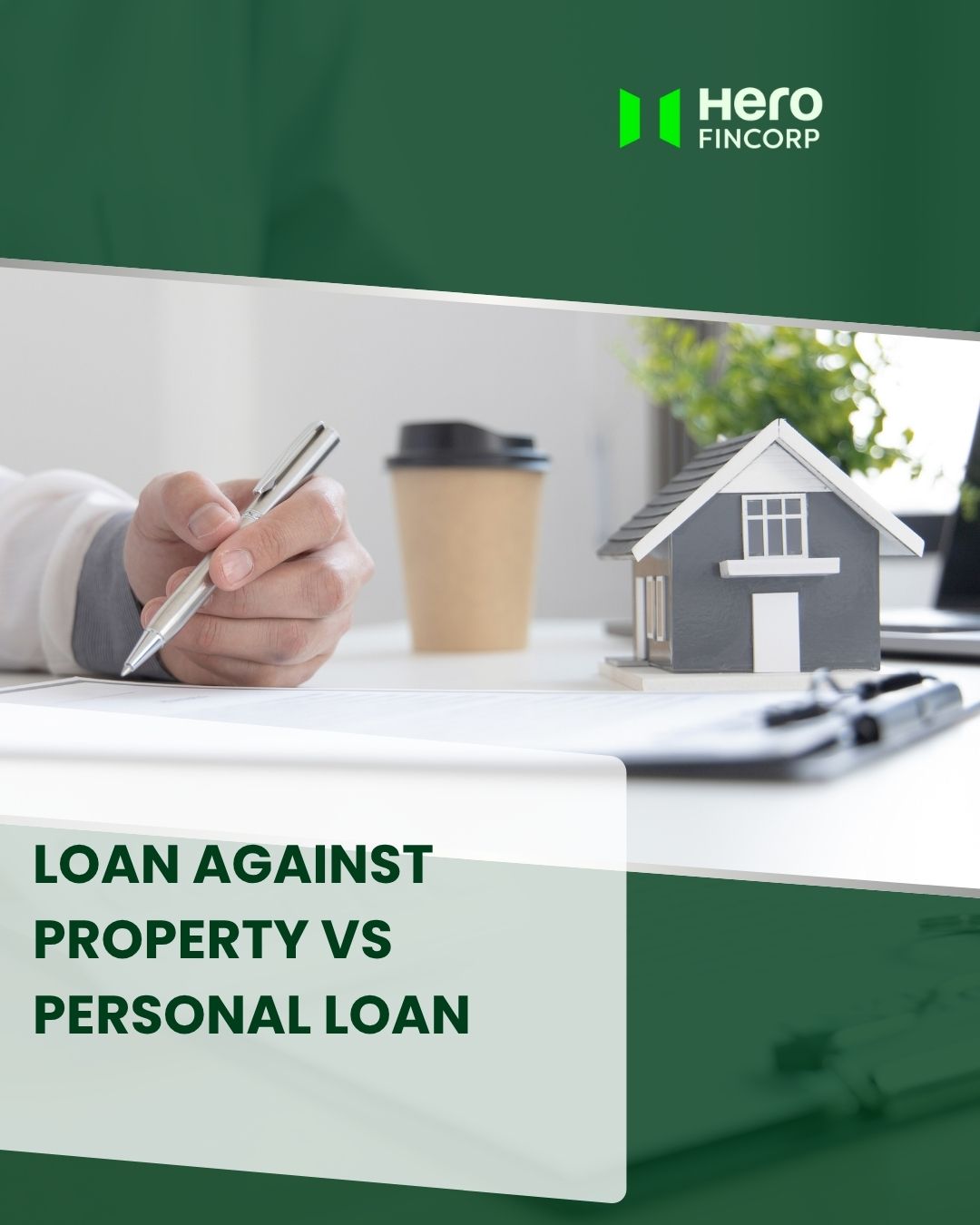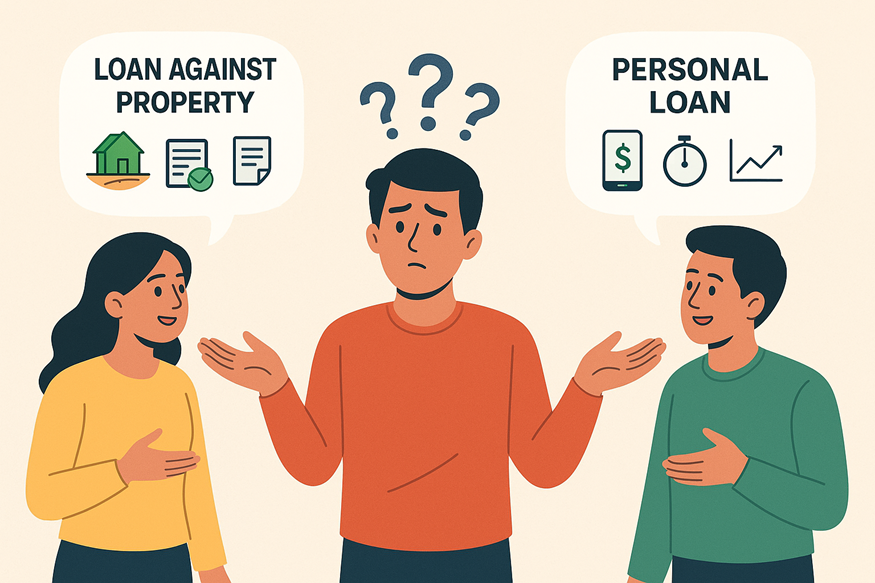Which is Better? Loan Against Property vs Personal Loan

Rakesh has an unexpected financial crunch. He needs funds quickly to cover his daughter's college admission.
His friend Meena suggests taking a loan against property. "You'll get a bigger loan amount at a lower rate," she says. But his other friend Amit disagrees. "A personal loan is much faster. Plus, there's no need to pledge anything," he insists.
Now Rakesh is confused. Which option makes more sense? Let's help Rakesh out of his dilemma.

What is a Loan Against Property?
A loan against property (often called LAP) is when you borrow money by keeping your property as a guarantee. The property can be your home, shop, or even a piece of land. You still own it, but the lender uses it as security until you repay the loan.
Features of Loan Against Property:
- Pledge your residential, commercial, or industrial property to get funds.
- Loan amount usually covers 70–80% of your property's value.
- Use the money for anything (business, education, weddings, or emergencies).
- Repayment tenure can stretch up to 15–20 years, offering smaller EMIs.
- Interest rates for loan against property are generally lower than those of other types of loans since you've provided property as security.
- Requires detailed paperwork and property valuation.
What is a Personal Loan?
A personal loan is when you borrow money based on your income, credit score, and repayment capacity. There's no property or security required.
Features of Personal Loan:
- You don't need to pledge any assets
- Quick approval and instant disbursal (Hero FinCorp sanctions loans in seconds)
- You can borrow anywhere from ₹50,000 to ₹50 lakh, depending on eligibility.
- Variable interest rates, starting from 19% p.a.
- Flexible repayment tenure of 1 to 3 years
- Minimal documentation and flexible end use (we offer an end-to-end seamless digital process)
Loan Against Property vs Personal Loan: The Differences
Here's how these two loan types stack up against each other:
1. Collateral Requirement
A loan against property needs you to pledge your home, shop, or land as security. It's ideal for those who own property and don't mind using it for funds. A personal loan, on the other hand, doesn't need any collateral.
This makes personal loans perfect for those who prefer a simpler, risk-free borrowing option.
2. Loan Amount
In a loan against property, the amount you can borrow depends on your property's market value. It is usually around 70–80% of its worth. With a personal loan, the loan amount is based on your income and credit history, typically ranging from ₹50,000 to ₹50 lakh.
3. Interest Rates
Since the property serves as security, the interest rate on a LAP is generally lower. A personal loan, being collateral-free, comes with slightly higher rates.
4. Processing Time
Getting a loan against property takes longer, as it involves property valuation and legal checks. But if time is of the essence, a personal loan is your best friend. Hero FinCorp can process and sanction it in just a few seconds through its digital platform.
5. Repayment Tenure
A LAP lets you spread repayments over a longer period (often up to 15–20 years), which helps reduce your EMI burden. A personal loan comes with a shorter repayment cycle, usually 1 to 5 years, ideal for smaller, time-bound needs.
6. Documentation
There's no escaping paperwork with a loan against property. You'll need property papers, valuation reports, and income proofs. But a personal loan keeps things light. Just basic KYC and income documents, all verified digitally.
7. Accessibility
A loan against property is only for property owners. On the other hand, personal loans are open to all, salaried or self-employed individuals. Most importantly, you can get it even if you don't own any assets.
| Factor | Loan Against Property (LAP) | Personal Loan |
|---|---|---|
| Collateral | Requires property as security (home, land, shop, etc.) | No collateral required — risk-free borrowing option |
| Loan Amount | 70–80% of the property's market value | Based on income & credit history (₹50,000–₹50 lakh) |
| Interest Rates | Lower, since the property is pledged | Slightly higher |
| Processing Time | Longer, due to valuation & legal checks | Much faster — Hero FinCorp can sanction it in seconds |
| Repayment Tenure | Flexible, up to 15–20 years | Shorter, usually 1–5 years |
| Documentation | Extensive (property papers, valuation, income proofs) | Minimal (basic KYC & income docs, verified digitally) |
| Accessibility | Only for property owners | Available to all salaried & self-employed individuals |
Pro Tip: Choosing a trustworthy partner for your LAP or personal loan is a good idea. Companies like Hero FinCorp guide you through every step and make things easy with a seamless online experience that keeps things transparent from day one!
Loan Against Property vs Personal Loan: Which is Better?
The choice between personal loan or loan against property depends on your specific needs.
A Loan Against Property would make more sense if you:
- Need a large sum for long-term goals like business expansion or education abroad.
- Own a property and are comfortable pledging it as security.
- Want smaller EMIs spread over many years.
Go for a Personal Loan if you:
- Need instant funds for emergencies or short-term expenses.
- Don't have property or don't want to risk one.
- Prefer minimal paperwork and a quick digital process.
- Want complete flexibility in how you use the money.
Also Read: Personal Loan Alternatives - You Should Consider
Loan Against Property or Personal Loan: Making the Right Call
Both options have their place, but personal loans win when speed and simplicity matter most. They're flexible, unsecured, and perfect for short-term financial gaps.
If you're looking for a quick, hassle-free way to manage your expenses, apply for a Hero FinCorp Personal Loan today. Your funds could be just seconds away.
FAQs
1. Why is loan against property typically cheaper than personal loan?
LAP is usually cheaper because you pledge property as collateral. As a result, the interest rates are lower compared to unsecured loans like personal loans.
2. Can I use a loan against property for personal expenses?
Yes. You can use the funds for personal, business, or educational purposes. There are usually no restrictions.
3. Which loan is better for emergencies?
Definitely a personal loan. It's quick, requires no collateral, and can be disbursed instantly, making it perfect when time is critical.